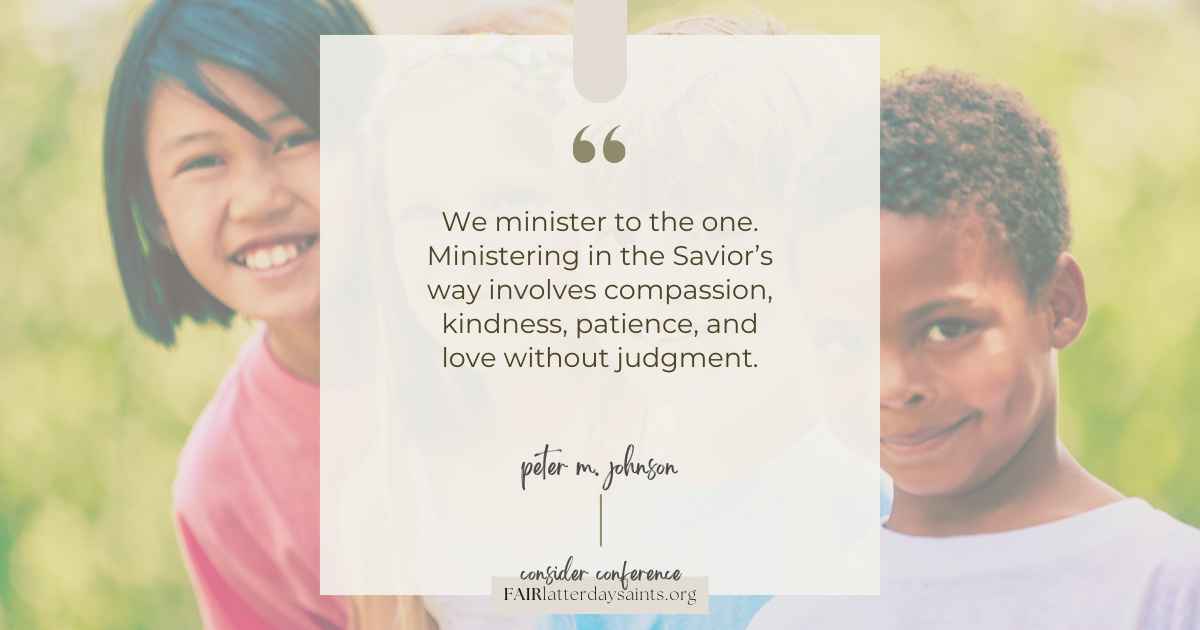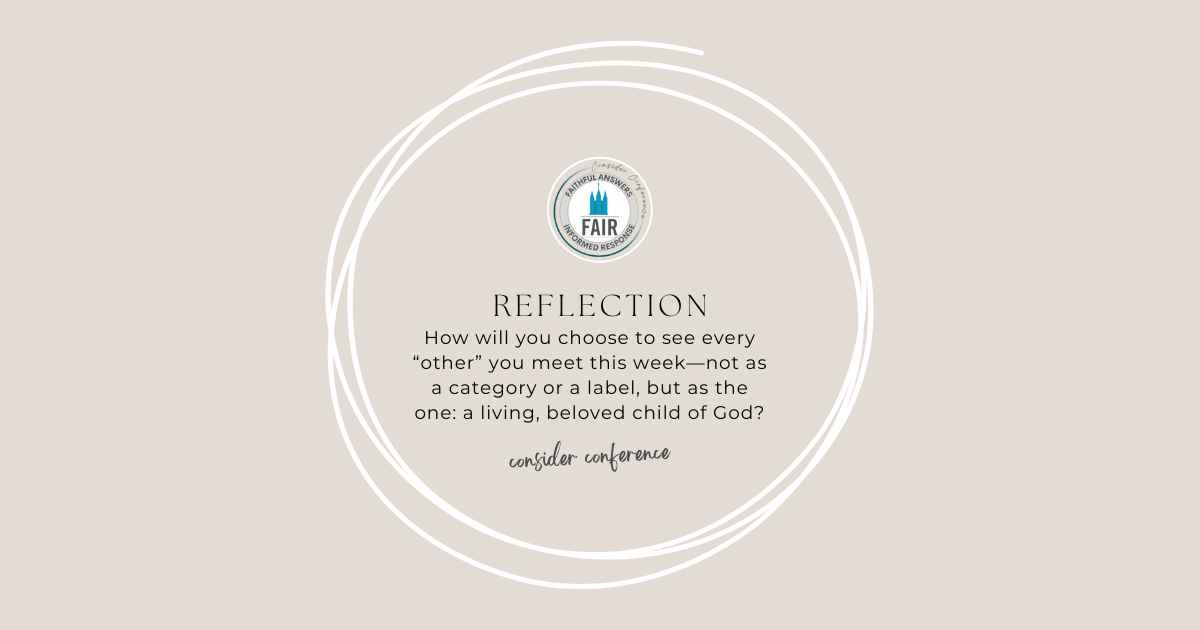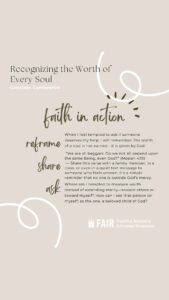
In his October 2025 General Conference address, Elder Peter M. Johnson taught that the greatest preparation for Christ’s return is to make our discipleship our highest priority. We do this by ministering “to the one” with compassion, kindness, patience, and love without judgment.
But who is the one? Sometimes it’s the stranger who feels invisible, like the Samaritan woman at the well. Sometimes it’s a family member carrying private wounds. And sometimes the one is us, in moments when we feel marginalized, unseen, or judged.
Yet many of us find it easier to minister only to those we already admire or approve of. What about the people we quietly label as “undeserving” of our efforts? Elder Johnson’s message challenges us to see every person as Christ does: “You are wonderful; you are beautiful; you are each a child of God”.
“We learn from Jesus Christ the power of ministering to the one with love and without judgment.” —Elder Peter M. Johnson
Common Misconception: I’m Not Obliged to Help

“The man has brought upon himself his misery; therefore I will stay my hand … for his punishments are just.” (Mosiah 4:17)
This temptation—to decide who is or isn’t worthy of our ministering—goes back to King Benjamin’s day. We sometimes assume that if people are suffering because of their own choices, we are justified in withholding compassion.
Fallacy at Work: Moral Desert Bias
Moral Desert Bias is the belief that people should always get exactly what they “deserve,” whether good or bad.
On the surface, it feels fair: reward the diligent, punish the lazy. But this way of thinking creates blind spots when applied to human relationships:
- It overlooks the unseen burdens people carry—trauma, poverty, illness, or circumstances we don’t understand.
- It ignores God’s pattern of extending mercy to all, not just to the “deserving.”
- It tempts us to act as judges of worth, when Christ alone is the Judge.
In the context of King Benjamin’s warning, the bias shows up when we rationalize: “He made bad choices, so I don’t have to help.” In modern life it might sound like: “She’s in debt because she’s irresponsible,” or “He’s addicted because he’s weak,” or even “If they really wanted help, they’d change.”
Elder Johnson’s Correction: Elder Johnson reminded us that every person is “wonderful, beautiful, a child of God”. The Savior Himself shattered the logic of moral desert when He ministered to the Samaritan woman at the well—someone her community deemed undeserving. And Elder Johnson’s story of his missionary companion shows what it looks like today: love and patience offered not because he “deserved” it in that moment, but because he was a child of God in need.
Resolving this Fallacy: When we give in to Moral Desert Bias, we act as though mercy is something people must earn (i.e., we judge them as worthy). But King Benjamin taught that we are all beggars before God (Mosiah 4:19). None of us “deserves” the abundance He gives us. That truth levels the ground: we minister not because others have earned our help, but because Christ has already given us grace we did not earn.
Living Apologetics: Ministering Beyond “Deserving”
A common struggle is the feeling that some people simply aren’t our responsibility. We may think: “Why should I help them? They made their bed—they can lie in it.” Or, on a broader scale: “They don’t belong here. Why should we have to care for them?”
Elder Johnson’s teaching reframes this mindset: discipleship means ministering “to the one” with compassion, kindness, patience, and love without judgment. The worth of a soul is not determined by nationality, race, social status, or even the mistakes of the past. As King Benjamin warned, when we say someone’s suffering is “just” and withhold our hand, we ourselves stand condemned (Mosiah 4:17–19).
But the struggle doesn’t only turn outward—it turns inward, too. Sometimes we say to ourselves: “I don’t deserve help either. I brought this on myself.” This is unrighteous judgment against ourselves. Christ never asked us to minister conditionally—even to our own souls. His invitation is always: “Come unto me, all ye that labour and are heavy laden, and I will give you rest” (Matthew 11:28). To accept His grace, we must also judge ourselves with mercy.
- If someone says: “I don’t deserve help.”
- You can respond: “None of us ‘deserve’ Christ’s love—but He gives it anyway. The question is not, ‘Am I worthy of help?’ but, ‘Will I let the Savior minister to me so I can minister to others?’”
Ways to Apply Today:
1️⃣ See the person, not the category. When you catch yourself thinking in labels—immigrant, addict, failure—pause and remember: “Wonderful. Beautiful. Child of God.”
2️⃣ Minister inward as well as outward. Extend patience and compassion to yourself. Judging yourself harshly blocks the Savior’s healing just as much as judging others.
3️⃣ Choose mercy over measurement. Before deciding if someone “deserves” your help, ask: “What does Christ want me to offer this person?”
Keep This Talk With You
Here is an invitation to see differently. Elder Johnson’s reminder that every person is wonderful, beautiful, a child of God challenges us to set aside the temptation to measure other’s worth. Whether the world says, “They don’t belong here” or our own heart whispers, “I don’t deserve help,” the Savior’s way of ministering is mercy without conditions.
This week, try one small step:
- Catch the judgment: When you find yourself thinking in categories—they brought it on themselves, they’re not like me, I don’t deserve help—pause and reframe: “We are all beggars before God” (Mosiah 4:19).
- Practice mercy inward and outward: Extend patience to someone who feels unseen, and extend that same patience to yourself.
- Remember the one: Pray specifically to notice “the one” you are called to minister to today.
How will you choose to see every “other” you meet this week—not as a category or a label, but as the one: a living, beloved child of God?

The Consider Conference series by FAIR offers an in-depth look at recent General Conference talks to help members of the Church of Jesus Christ of Latter-day Saints navigate common questions, misunderstandings, and criticisms. Each post provides doctrinal insights, historical context, and practical ways to apply gospel principles in everyday conversations. Through this series, we hope to equip readers with faith-promoting resources that encourage thoughtful reflection, respectful dialogue, and a stronger foundation in gospel truths, fostering both personal conviction and meaningful discussions with others.
The post Recognizing the Worth of Every Soul appeared first on FAIR.
Continue reading at the original source →




